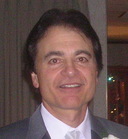Interview with poet Michael Keshigian
11/9/15
11/9/15

1. What is the importance of reading and writing poetry in the 21st century?
Poets tend to exemplify the power of attentiveness. They dwell upon those aspects of life that 21st century living sometimes obscures. Nature's details and nuances, subtleties of human emotion, for example, do not escape the poet's notice. Reading, especially, and writing, for those of us lucky enough to inherit the observation gene, keeps us grounded to the essence of what is human.
2. How have other poets helped to shape your own creativity?
By reading the work of various poets, one discovers effective techniques of conveyance. Verbal succinctness, musicality, rhythm as well as ideas are readily available to discern once the task of study is undertaken as well as the ability to learn how to put forth your own thoughts in an accessible manner.
3. What is one of your favorite lines of poetry and why?
It was in the novel Steppenwolf, by Hesse, where the lines, "Whoever wants music instead of noise, joy instead of pleasure, soul instead of gold, creative work instead of business, passion instead of foolery, finds no home in this trivial world of ours—" fortified my conviction to go forward as a musician and artist. Though prose, the lines are poetic and rang true when, at the time, many relinquished the dream of a creative lifestyle for monetary success. In those early, formative years, those words helped me gain comfort under my own skin.
Poets tend to exemplify the power of attentiveness. They dwell upon those aspects of life that 21st century living sometimes obscures. Nature's details and nuances, subtleties of human emotion, for example, do not escape the poet's notice. Reading, especially, and writing, for those of us lucky enough to inherit the observation gene, keeps us grounded to the essence of what is human.
2. How have other poets helped to shape your own creativity?
By reading the work of various poets, one discovers effective techniques of conveyance. Verbal succinctness, musicality, rhythm as well as ideas are readily available to discern once the task of study is undertaken as well as the ability to learn how to put forth your own thoughts in an accessible manner.
3. What is one of your favorite lines of poetry and why?
It was in the novel Steppenwolf, by Hesse, where the lines, "Whoever wants music instead of noise, joy instead of pleasure, soul instead of gold, creative work instead of business, passion instead of foolery, finds no home in this trivial world of ours—" fortified my conviction to go forward as a musician and artist. Though prose, the lines are poetic and rang true when, at the time, many relinquished the dream of a creative lifestyle for monetary success. In those early, formative years, those words helped me gain comfort under my own skin.